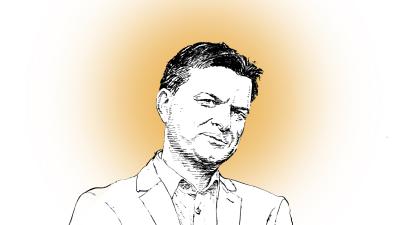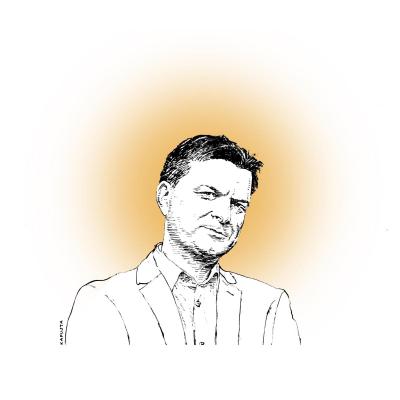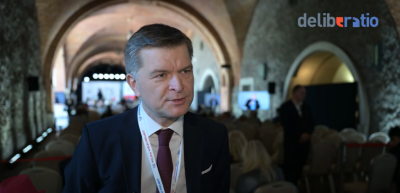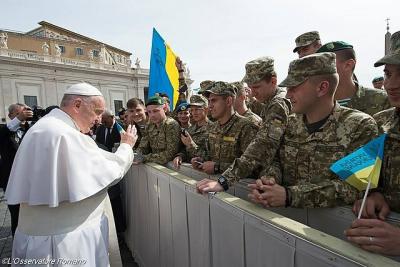When St Justin the Philosopher debated with pagan sages in the second century after Christ, he heard from them: show me your writings and we will tell you who you are. We could address the same request to contemporary environmentalists and conservationists: show us your writings and we will tell you where your thought comes from.
In the popular consciousness, environmental issues are now regarded as a kind of ideological protectorate of the left. However, if we were to ask today's Green Party activists or Greenpeace supporters to identify texts advocating environmental protection that date back to before the 1960s and were written by left-wing authors, they would have a huge problem with this.
Praise for creation
Modern environmental consciousness was born at the end of the 19th century in conservative circles critical of the Manchester model of capitalism. It was a reaction to rapid industrialisation with no regard for environmental degradation. For the Left at the time, this posed no problem at all - quite the contrary: for rampant industrialisation meant the growth of the proletariat and therefore brought the victory of the bright system of the future closer. There was nothing closer to the heart of a socialist than a landscape full of smoking chimneys. This was most evident in the Soviet Union, where the authorities there, developing heavy industry, wreaked havoc on nature on an enormous scale (it is symptomatic, by the way, that the biggest polluters of the environment in the history of mankind were the communist countries, once the USSR and, after its collapse, the People's Republic of China). As late as the mid-1950s, French intellectual Simone de Beauvoir wrote that the right and the left differed in that the former believed in a return to nature and the latter in production and industry.
The first modern environmentalists referred to Christianity. They recalled the attitude that such prominent figures in the history of the Church had towards nature, such as St Francis of Assisi - the author of songs praising creation, St Martin de Porres - the founder of the world's first shelter for homeless animals, or St Hildegrad of Bingen, who constantly emphasised the respect we should have for nature as a gift from God. The Bolandist records mention the names of around 30 saints who were particularly sensitive to the plight of our 'lesser brothers'. They also pointed to a medieval Benedictine monastery as an example of environmentally sustainable development. At the end of the twentieth century, one could read in the pages of the Polish environmentalists' magazine Zielone Brygady that "the problems with the state of the environment started exactly when the Church lost its soul government and corporatism was replaced by the free market, i.e. about 200 years ago".
Olaf Swolkien, one of the pioneers of alter-globalism in Poland, blamed the environmental crisis mainly on liberal ideology, which in its praise of the pursuit of unlimited profit had no regard for the environment. As an alternative, he presented conservatism, the ingredients of which are - according to him - "not succumbing to doctrines, not sanctifying fragments of reality out of context, seeing the world and man as a whole, the balance between reason and feeling, and the priority of the natural over the contrived."
"Conservare" means to preserve
It is no coincidence that the founder of the world's first national park, was a conservative politician. In 1872, U.S. President Ulysses Grant, who came from the Republican Party, established a park in Yellowstone. In justifying his decision, he appealed to the sensibilities, terminology, and consciousness of conservatives.
After all, caring for nature is intrinsically conservative, because the word 'conservare' means 'to preserve' in Latin, and the meaning of pro-environmental activity is precisely the preservation of the natural environment. The term 'ecology' itself, in turn, comes from the Greek expression 'oikos logos', literally 'science of the home', although it could be better translated as care for the common home. Such an attitude falls entirely within the conservative worldview.
It is symptomatic of the fact that the largest number of national parks and nature reserves in America were created by another Republican president, Theodore Roosevelt, who was in office from 1901 to 1909. He often pushed through his plans against the wishes of Congress. A great many of his speeches have survived in which he said that it was the duty of the citizens of the United States to conserve, that is, to protect nature for future generations of Americans. He regarded the destruction of natural resources as robbing the next generations who would come after us. He said: "A good farmer is one who leaves the land to his children in better condition than he took it over. I believe the same applies to us as a nation".
As an interesting aside, the most pro-environmentalist US president of the 20th century was Republican Richard Nixon, who created the Environmental Protection Agency and introduced the largest package of environmental laws in US history. An analogous role in the UK was played by Prime Minister Margaret Thatcher, who pushed through comprehensive environmental legislation, including, among other things, anti-smog laws. When we analyse her famous Brighton speech of 1988 years later, we realise that it was also a great environmental manifesto. At the time, the British Prime Minister was saying that the Conservatives were not only friends of the Earth, but guardians of it. We do not own the Earth. We did not get to own it. We lease it, and we must pass it on to the next generation.
Listening to the voice of nature
A similar situation to that in the USA also prevailed in other countries, including Poland. When the Republic of Poland regained its independence in 1918, the founders of the first Polish national parks and the founders and leaders of the League for Nature Conservation were mainly right-wing activists, most often coming from national democracy or conservative circles. Jan Gwalbert Pawlikowski played a special role among them. He was the author of the first Polish manifesto for nature conservation entitled "Culture and Nature" and published as early as 1913, i.e. at a time when Poles had not yet regained their freedom. A year earlier, the first Polish environmental organisation, the Section for Nature Protection operating within the Tatra Society, had been founded on the initiative of the aforementioned Jan Gwalbert Pawlikowski. His work was also a kind of "decalogue of eco-ethics", which was the basis of ecological ethics, proclaiming the "apostolate of the idea of nature protection", as well as the first Polish law on nature protection of 1934.
In the inter-war period in Poland, ecology was the domain of national circles, and one of the most important figures in this movement was Stanisław Piasecki - editor-in-chief of the then most influential right-wing literary weekly "Prosto z Mostu". Already in those days, he postulated the need to move towards solar energy and organic farming. Historian Jarosław Tomasiewicz, describing this phenomenon of 'eco-endeavour', noted that 'the pro-ecological stance was a logical complement to the right-wing worldview'. In this context, he mentioned such works by national politicians as Roman Dmowski's 'Zagadnienia rządu' (Issues of Government), Adam Doboszynski's 'The National Economy' or Stanisław Piasecki's 'The Right to Creativity', already mentioned.
Similar ideas in the first half of the 20th century were promoted in literature by writers who were close to the programme of the Right. Much more often than writers sympathetic to the Left, they listened to the voice of nature. The 1924 Nobel Prize winner Władysław St. Reymont - a supporter of the National Democrats and a friend of Roman Dmowski - can be counted among this group. To see this, it is enough to compare his description of a city in "The Promised Land" and a village in "Chlopy". Another eminent writer, Józef Mackiewicz, a declared conservative and implacable anti-communist, also described himself as a "patriot of the landscape". Analogous tendencies prevailed in the whole of European literature, to mention just such figures as Grazia Deledda (Italian Nobel Prize winner in 1926) or Gilbert Keith Chesterton (creator of the so-called "rurism", i.e. a movement advocating leaving the metropolitan lifestyle and returning to the countryside).
Christianity in the dock
Although the roots of modern conservation thought are decidedly conservative, the second half of the 20th century, and especially after 1968, saw the takeover of this issue (and, in time, its monopolisation) by formations with a leftist worldview. This process was accompanied by an increasing blaming of Christianity for the current environmental devastation. Of all the flood of critical texts on the subject, it is worth noting Lynn White jr.'s essay 'The Historical Roots of the Environmental Crisis'. "The Historical Roots of the Environmental Crisis". Published in 1967, it became a kind of manifesto for environmentalists critical of Christianity, such as Kade, Lidke, Megivern, Wolf and Altner, among others. It is worth addressing briefly the accusations made there.
According to White, the origins of the modern destruction of nature should be sought in the victory of the Christian religion over pagan beliefs. At that time, man ceased to be treated as a part of Nature and began to see himself as an entity separate from it, not to mention as someone created to rule over it. Nature was thus objectified, and then - treated with hostility - became the victim of merciless exploitation. All this, according to White, was in line with the injunction addressed by God in Eden to our first parents: "Be fruitful and multiply, that you may populate the earth and make it subject to yourselves; that you may have dominion over the fish of the sea, over the fowl of the air, and over all the animals that creep upon the earth" (Genesis 1:28-30). Some critics of the Church see this commandment as the source not only of an ecological disaster, but also of a demographic one (conceiving, reproducing and populating the earth).
This commandment was repeated and even extended after the Flood. Before that, God had allowed people to eat only plant foods, but then he lifted the food taboo and allowed the eating of meat foods. He told Noah and his sons: 'Be fruitful and multiply, so that you may populate the earth. And let all the beasts of the earth and all the fowls of the air fear and dread you. Everything that moves on the earth and all the fish of the sea have been given over to you. Everything that moves and lives is given to you for food, just like the green plants, I give you everything" (Genesis 9:1-3). According to the aforementioned critics, as long as the above directive was respected only by a small nation in the Middle East, it had little consequence for the environment; it was only when it became the basis of a globally dominant civilisation that it proved to be a deadly threat to nature on a global scale.
In order to prevent an environmental catastrophe, it is therefore necessary - according to White - to fight not against its effects, but against its causes. These, in turn, are already recorded in the first chapter of the Bible. As Jean-Paul Deleage writes in his 'History of Ecology': "In White's view, our ecological crisis will end only on the day when we renounce the postulate of monotheistic religions according to which nature's only raison d'être is to serve man".
The gardener's mission
The aforementioned argumentation, however, is based on a very superficial knowledge of Christianity (and also of Judaism, since Genesis is common to both these religions). Their adherents represent a point of view that was aptly put by the former deputy minister of environmental protection in Poland, Slawomir Mazurek: "Since the Bible is a timeless word, this means that this use of the earth, of which the Book of Genesis speaks, must continue over time, and thus involve many generations. This implies a concern for the preservation of nature and not an encouragement to destroy it. It is no coincidence that the vision of the garden as the ideal place for humans to live appears at the very beginning of Scripture. Adam and Eve are given the task of ruling over the garden, that is, they must take on the duties of a gardener, that is, someone who cares for the area of nature entrusted to him in order to keep it in the best possible condition."
The eminent Catholic philosopher Fr Mieczyslaw Krąpiec noted that the command in Genesis "is not so much about the mastery of the earth by man as about the transcendence of what is 'earthly' by man. God's command: 'make the earth subject to yourselves' means so much that one should not submit to the 'earth' but transcend it, transcend it, make all that is 'earth' subject to the human spirit." In this sense, St Paul exhorted us not to serve earthly things, but to 'seek what is above'." This is in line with the Christian understanding of man's vocation, which is to be transformed and conformed to God from a fallen, animal-like being. The Genesis injunction is therefore moral, not socio-technical.
Also, the word 'reign', which appears in the Bible, is to be understood in the sense in which it is used, which is religious. The Lord of all that exists is God, and man was created in His image and likeness. Therefore, man's rule must be an imitation of the rule of the Creator. In Christianity, God is not a tyrant devoid of reason, a plunderer, an exploiter, a destroyer and a pest; on the contrary, he bestows his protection, all his graces and the meaning of existence on his creatures. Therefore - as the theologian Fr. Jacek Salij, the theologian, writes: "Man is supposed to deepen, as it were, the reasonableness and goodness of God's work; he is supposed to become, as it were, an elder brother to creatures inferior to himself. If, therefore, it seems to him that dominion consists in wreaking havoc and pain around him, he is a follower of the devil the destroyer, and not of God the Giver and Protector. For God has called man to rule over creation, not to tyranny".
The Bible speaks of this as follows: "The Lord God therefore took man and placed him in the garden of Eden to cultivate and tend it" (Genesis 2:15). Man thus becomes the keeper of the garden, to act as a homeostat, to be a stabiliser in the cosmic system. Siddhaswarupananda Paramahamsa interprets this passage as follows: "We must remember here that everything is given to us. If we consider that we are here only for a short period of time, so wouldn't it be more correct to say that everything has been lent to us. God has not given us ownership of it all. It is still God's property, but He has given it to us just as someone gives something to someone to be responsible for it: -I give it to you and you be responsible for it, take care of it'.
Man's bond with creation
Note that Genesis gives us two accounts of the creation of the world: in the first (Yahwistic-Elohistic), God called man into existence after all creation; in the second (Priestly), in the middle of all creation. In the former, man is the crowning glory of creation; in the latter, he is its centre. Both accounts, however, show the inseparable bond between man and created reality. This inseparability is evidenced, for example, by the fact that the fall of man, i.e. original sin, resulted in the contamination of the whole world. God said to Adam: "cursed be the earth because of you" (Genesis 3:17).
Despite the sinfulness of human beings, God does not abandon his creation. When He sends the Flood, He orders Noah to take one pair from each animal species into the ark. This rescue is an emphatic emphasis on the integrity of all creation. Admittedly, after the Flood, God breaks the food taboo and allows man to eat meat, but in the same Noahic covenant he utters words that - due to the circumstances of time and place - no Jewish author could have invented: "I, I make a covenant with you and with your offspring who will be after you; with every living creature that is with you: with the fowl, with the domestic and field animals that are with you, with all that came out of the ark, with every animal on the earth" (Genesis 9:9-10). It is worth adding that God never backed out of this covenant. When He renounced the destruction of Nineveh, He told Jonah that He had done so not only for the sake of the "one hundred and twenty thousand people", but also for the sake of the "multitude of animals" (Jon 4:11).
Since man's sin caused the contamination of all nature, the overcoming of sin should result in the renewal of that nature. Therefore, the promise of transfiguration applies to the whole of created reality. Even St Paul the Apostle, suspected by some of a grudge against flesh and matter, writes explicitly about this: "For I judge that the sufferings of the present cannot be placed on a par with the glory that is to be revealed in us. For the creation awaits with longing the manifestation of the sons of God. For the creature has been subjected to futility - not of its own accord, but for the sake of Him who subjected it - in the hope that it too will be freed from the bondage of corruption to share in the freedom and glory of the children of God. We know, after all, that the whole creation groans and sighs in the pains of childbirth until now. But it is not only it, but we ourselves also, who already possess the first gifts of the Spirit, and we also with our whole being groan, awaiting (adoption as sons) - the redemption of our body" (Romans 8:18-23).
Thus, the Apostle writes about the participation of the whole creation in the freedom and glory of God's children. That Christ is the saviour not only of man but of the whole world, St Paul also mentions explicitly in another letter: "For he (God) willed that in him should dwell all fullness, and that through him all things should be reconciled to himself again: through him both that on earth and that in the heavens" (Colossians 1:19-20).
Redeemer of creation
Theological reflection on Christ as the redeemer of the whole cosmos was already deepened by ancient Christians, to mention only the martyr and bishop of Lyons, St Irenaeus, who died in 202. However, this thought has particularly developed in the Orthodox Church, where the Eucharistic liturgy of the Transfiguration treats it as a celebration of the transfiguration of the entire physical universe. During the elevation, the priest says that the sacrifice of Jesus was accomplished "kata panta kai dia panta", which can be translated from Greek as: "according to everything, for everything and because of everything".
As Orthodox theologian Nikolai Arseniev writes: "It is not only man himself who experiences the effects of redemption and the joy of victory. With the joy of our resurrection is also connected the joy of the redemption of the whole world, of the coming to an end of the reign of corruption, of the redemption of all creation and of the dawn of the kingdom of life (...) The resurrection is thus an event of cosmic significance. The world on a par with man is here penetrated by the rays of heavenly glory, albeit for the time being in a hidden form, and has attained a new and higher value. For it has already received into itself the seed of immortality".
A similar thought is not alien to Catholics either. In 1870, the Fathers gathered at the First Vatican Council stated that, in view of the continuance of love and its work, the whole creation that God had made would continue. Developing this theme, Fr John Grzesica writes: "Since, therefore, earthly realities, and among them the natural environment of man, are granted some form of eternal duration if they do not face inevitable annihilation, then their 'finality' indicates their great value and at the same time sheds some light on the direction of their further development, and they are the beginning of the kind of state that awaits them in their final destiny." The recognition of this value of the environment in the light of its destiny requires cooperation between man and the environment".
In his 1987 encyclical Sollicitudo Rei Socialis, John Paul II wrote in turn that "dominion, commanded by the Creator to man, does not mean absolute power, there can be no freedom to 'use' or dispose of things freely. The limitation imposed on man from the beginning by the Creator Himself and expressed symbolically in the prohibition to 'eat the fruit of the tree' makes it clear that, with regard to visible nature, we are subject not only to biological but also to moral limitations which cannot be transgressed with impunity."
For this reason, John Paul II believed that the devastation of the natural environment involves a violation of the Decalogue. This is what he said in 1991 during his homily in Bialystok: "Nature suffers because of man. We should use the gift of dominion over nature with a sense of responsibility, an awareness that it is the common good of mankind. This is also about the seventh commandment: 'Do not steal'. Water, air, earth, forest, animals, plants were created by God and deserve respect from man."
There are many more similar examples of Christian reflection on our relationship to the environment, both spiritually, morally and socially. They show that holding the religion of Christ responsible for the modern devastation of nature is not supported by the facts. Quite the opposite can be observed: the crisis of Christianity within Western civilisation has coincided with an ecological catastrophe - and this is no coincidence. Perhaps, then, a return to evangelical ideals will be conducive to preserving nature for our descendants in a better state than we inherited it from our ancestors.












Comments (0)